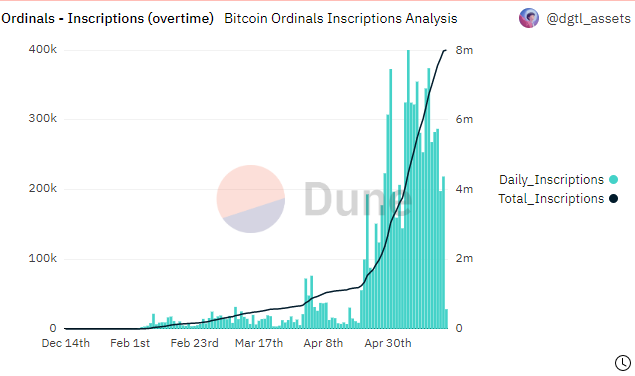According to a report compiled by a Dune Analytics contributor, the total network fees paid for the minting of Bitcoin Ordinals reached 1,414 Bitcoin (BTC), or $38.2 million, on May 20, representing an increase of 700% from April 20 and 831% from April 1, respectively. An analysis shows that despite continued interest in Bitcoin nonfungible tokens (NFTs), most Bitcoin Ordinals have shifted to text-based inscriptions, compared with a somewhat equal balance of text and image inscriptions from February to April.
As explained by cross-chain wallet BitKeep, Bitcoin Ordinals “is a numbering system that assigns a unique number to each individual SAT [Satoshi, or 1/100 million of a Bitcoin], enabling its tracking and transfer.“ Combined with the inscription process, which adds an additional layer of data to each satoshi, this allows users to mint unique digital assets on the Bitcoin blockchain.
In contrast to traditional NFTs, which are built using smart contracts and hosted on solutions such as the InterPlanetary File System, BitKeep developers explained that “Ordinals reside entirely on the Bitcoin blockchain and do not require a sidechain or separate token.“
In January 2023, Web3 developer Rodarmor released the Bitcoin Ordinal theory framework. On top of this, Web3 developer domo created the BRC-20 Bitcoin token standard in March 2023, employing both Ordinals and inscriptions to create and manage token contracts, token minting, and token transfers on Bitcoin.
Since then, over 8 million Bitcoin Ordinals have been minted, along with 24,677 BRC-20 tokens created, boasting a total market cap of $612.5 million. On May 20, cryptocurrency exchange OKX announced the listing of the Ordinals (ORDI) BRC-20 token, with a market cap of over $300 million.
Magazine: Ordinals turned Bitcoin into a worse version of Ethereum: Can we fix it?














